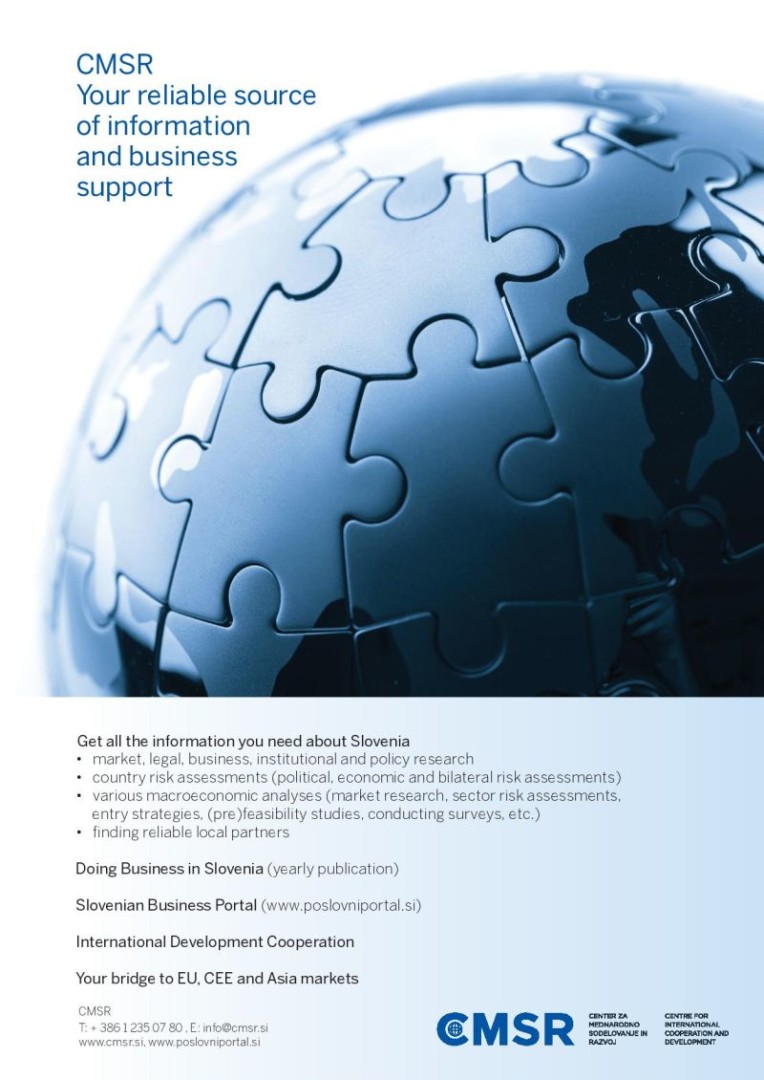Residents and non-residents
Slovenian legislation does not distinguish between foreign and domestic investors, but between residents and non-residents. The Foreign Exchange Act defines residents as:
- companies and other legal persons with their seats registered in Slovenia, with the exception of their branches in other countries that perform business activity;
- branches of foreign companies registered in Slovenia if they are engaged in business activity;
- individual entrepreneurs and natural persons who run their own business and have their seat or permanent residence in Slovenia;
- natural persons with a permanent residence in Slovenia;
- natural persons with a temporary residence in Slovenia based on a permit valid for a minimum of 6 months, with the exception of foreign nationals employed in diplomatic and consular missions in Slovenia and members of their families; and
- Slovenian diplomatic, consular and other representations abroad financed from the national budget, Slovenian nationals employed in such representations, and members of their families.
All other persons are considered to be non-residents.
The principle of national treatment
The treatment of foreign companies and entrepreneurs in Slovenia is regulated by the Companies Act in a chapter on foreign undertakings.
A foreign undertaking is defined as a natural or legal person that performs a business activity in Slovenia and has their residence or place of business abroad. Foreign undertakings must conduct their business activities through an entity registered in Slovenia.
The Companies Act stipulates that, as a principle, with regard to its rights, obligations and responsibilities, a foreign undertaking is equated with domestic undertakings or entrepreneurs with a registered office in Slovenia in respect of business conduct in Slovenia, unless otherwise provided by the applicable legislation.
Protection of foreign investors
Slovenia follows the OECD principles regarding the protection of foreign property. The repatriation of capital and transfer of profits are free once tax liabilities and other obligations have been paid. Expropriation, nationalisation or any other measure with an equivalent effect is prohibited except for public purposes, on a non-discriminatory basis, under due process of law and in exchange for prompt, adequate and effective compensation.
Sectoral limitations
Slovenia has a liberal foreign investment regime. The movement of capital is fully liberalised and in line with the EU’s rules.
In the field of inward direct investment, all sectors (except the operation of games of chance) are open to investors from the European Economic Area (EEA) whereas certain investment restrictions for non-EEA residents apply in a small number of sectors like maritime transport and air transport. Non-EEA institutions are also unable to establish branches for the purpose of providing depositary services to resident collective investment funds.
Reciprocity is required for non-EEA residents in areas such as cross-border transport and real-estate investment.
In the area of cross-border trade, certain restrictions apply to non-EEA service providers in sectors like insurance services (except direct insurance services and direct insurance intermediation for the insurance of risks relating to transport; reinsurance and retrocession); and most other financial services (except for lending of all types; giving guarantees and commitments to domestic legal entities and sole proprietors; providing and transferring financial information and financial data processing and related software by suppliers of other financial services; and certain advisory and other auxiliary financial services).
Non-EEA banks can provide all services (banking, financial, additional), but they must first obtain the Bank of Slovenia’s permit and establish a branch in Slovenia.
Slovenia has implemented Regulation 2019/452/EU on the screening of foreign direct investment into the Union. Investments made by foreign investors that would lead them to acquiring an interest of at least 10% must be notified to the Ministry of Economic Development and Technology (MGRT) if such investments are made in the fields of critical infrastructure, technologies or inputs, access to sensitive information, freedom and pluralism of the media, or projects and programmes listed in Annex 1 of the mentioned Regulation.
Real-estate investment
Slovenian citizens and legal entities may buy and own real estate in Slovenia without limit. Companies established or purchased by foreign nationals in Slovenia are Slovenian legal entities and hold the same property rights as companies established by domestic persons.
For non-citizens and legal entities established outside Slovenia, the following rules apply:
- Citizens and legal entities from EU, EEA and non-EU/EEA OECD countries, as well as persons with the status of a Slovenian without Slovenian citizenship, may freely and unconditionally invest in and acquire real estate in the territory of Slovenia.
- The citizens and legal entities of EU candidate states which are not OECD members (Albania, Bosnia and Herzegovina, Montenegro, Moldova, North Macedonia, Serbia, Ukraine) may acquire real estate in Slovenia according to the principle of reciprocity.
- Citizens and legal entities from all other countries may only own real estate if they have both inherited it and if the reciprocity principle is observed under the conditions set out in the Inheritance Act.
There are no restrictions on the leasing of real estate by foreign nationals.
Dispute resolution
Slovenia has a civil law system based on the Continental European law tradition. Regular court proceedings are the most commonly used method of resolving disputes.
Courts of general jurisdiction have three levels. Courts of first instance are divided into local courts with jurisdiction over civil cases concerning claims for damages or property rights up to a certain value, the disturbance of possession, tenancy relations etc. and district courts dealing with civil cases which exceed the jurisdiction of local courts, commercial disputes, copyright and IP cases, the confirmation of rulings of a foreign court etc. Courts of second instance decide on appeals lodged against decisions by courts of first instance. The court of third instance is the Supreme Court of the Republic of Slovenia and is the highest court in the country.
Specialised courts comprise the Administrative Court providing the judicial review of administrative acts; labour courts with jurisdiction in individual and collective labour disputes; and a social court which holds jurisdiction in social insurance disputes.
Court decisions are binding and enforceable. Foreign judgments are enforced under the provisions of the relevant EU law, bilateral or multilateral treaties and domestic procedural rules.
Mediation and, less commonly, arbitration are used as types of alternative dispute resolution.
Courts of first and second instance carry out alternative dispute resolution via ADR offices organised within the courts. A mediation board operates within the Slovenian Insurance Association and in some other non-governmental organisations and private institutions. Mediation may also be carried out by individual mediators.
Investment treaties
Bilateral agreements on mutual promotion and protection are in force with the following countries: Albania, Bosnia and Herzegovina, China, Egypt, Israel, Kuwait, Moldova, North Macedonia, Serbia, Singapore, Switzerland, Thailand, Turkey, Ukraine, the United Kingdom, and Uzbekistan.
Bilateral investment treaties between EU member states (intra-EU bilateral investment treaties) were terminated on the basis of the Agreement for the termination of intra-EU bilateral investment treaties between the member states, signed on 5 May 2020, or on the basis of a bilateral agreement between member states. The BIT with the United Kingdom is also in the process of termination.
All bilateral investment treaties between the Republic of Slovenia in third countries (non-EU member states) have to be adjusted to the EU investment policy reform. Also, all new bilateral investment treaties with third countries will have to follow the new model BIT which is being prepared.
Slovenia, as an EU member state, is also a contracting party to investment treaties signed between the EU and its member states and third countries. The investment provisions could be in the form of a self-standing agreement such as the Investment Protection Agreement with Singapore or the Investment Protection Agreement with Vietnam (while both have been signed, but they will only come into force when all parties have ratified the agreement). Investment protection provisions can also form an integral part of free trade agreement between the EU and third countries, such as CETA.
Business incentives
A wide range of investment incentives, tax incentives, incentives for employment, export and internationalisation, incentives for SME, high-value added companies and innovative start-ups, and various local incentives are available to foreign and domestic owned companies to start or expand their business in Slovenia.
SPIRIT Slovenia – Information point for foreign investors
The public agency SPIRIT Slovenia regularly updates its overview of all current calls for tenders in Slovenia, for which any company registered in Slovenia may apply irrespective of its ownership structure. The list of calls for tenders with basic information in the English language is available at the website www.sloveniabusiness.eu.
Investment incentives
Investment incentives are regulated by the Investment Promotion Act which lays down the forms of investment incentives, the terms and conditions, and the criteria and the procedure for granting investment incentives. Investment incentives focus on achieving higher added value per employee and encourage capital-intensive investments in more advanced technology and business process automation that contribute to a green transition, circular economy, higher business productivity, better recovery, resilience, growth and competitiveness. They may be granted in the form of:
- grants,
- loans, guarantees or subsidised interest rates, or
- purchase of property owned by a local community at a lower than market price.
The criteria for awarding incentives focus on support of investments with highly productive, long-term sustainable, competitive, socially responsible and sustainable business models, responsible resource management and positive economic, environmental, spatial and social impact on the region in which the investments will be carried out.
Conditions for granting investment incentives
Incentives may be granted for an investment of a domestic or foreign-owned company in Slovenia, if the conditions set by the Investment Promotion Act are met. Investment means an investment in tangible and intangible assets related to the setting-up of a new establishment, extension of the capacity of an existing establishment, diversification of the output of an establishment into products not previously produced in the establishment or a fundamental change in the overall production process of an existing establishment.
| Conditions for granting incentives | |||
|---|---|---|---|
| Manufacturing | Service activities | R&D activities | |
| General conditions (SPIRIT Slovenia tenders) | |||
| Investment value | €1,000,000 to €12,000,000 | €500,000 to €3,000,000 | €500,000 to €2,000,000 |
| Other conditions | at least 50% of the investment value in machinery and equipment; maintenance of existing jobs, increase of added value per employee. | ||
| Investments in R&D and innovation projects (Application to MGRT) | |||
| Investment value | €500,000 | €500,000 | €500,000 |
| Jobs | maintenance of existing jobs | ||
| Investment value | €2,000,000 | €2,000,000 | €2,000,000 |
| Other conditions | At least 5 investors, investors structure in the line with Regulation 651/2014/EU increase of added value per employee. | ||
| Investments that significantly contribute to developing the Slovenian economy (Application to MGRT) | |||
| Investment value* | €12,000,000 | €3,000,000 | €2,000,000 |
| New jobs within 3 years | 25 | 20 | 10 |
| Other conditions | at least 50% of the investment value in machinery and equipment; least 5 highly qualified jobsincrease of added value per employee. | ||
| Strategic investments (Application to MGRT) | |||
| Investment value | €40,000,000 | €40,000,000 | €20,000,000 |
| New jobs within 10 years | 200 | 200 | 100 |
| Other conditions | maintenance of the investment in Slovenia for at least 10 years;maintenance of the new jobs for at least 5 years;increase of added value per employee;positive economic, environmental, spatial and social impact on the region;integration in urban areas. | ||
All investments must also meet conditions regarding consistency with the spatial development plan and have positive impact shown in a economic, financial, technical, spatial and technological feasibility and eligibility study; they must meet the minimum threshold of the number of investment assessment points and the work on the investment or activity must not start before an application for an incentive is submitted to the SPIRIT Slovenia or to the Ministry.
Incentives are in line with EU rules on state aid. The maximum amount of financial incentives is 10 - 50 % of the eligible costs, depending on the size of company and the location where the investment will be carried out (Regional aid map A and C).
Grants
Subsidies under general conditions are granted on the basis of a call for tenders carried out by SPIRIT Slovenia. Calls for tenders are published in the Official Gazette and on SPIRIT’s website.
Grants for investments that significantly contribute to developing the Slovenian economy and grants for investments in innovations and R&D projects may be awarded without a call for tenders. Investors should send their applications for a grant to the Ministry of Economic Development and Technology (MGRT) using the prescribed form. If a grant is approved (if the conditions for awarding of grant are fulfilled and if the budgetary resources are provided), the MGRT, the investor and the incentive recipient (or beneficiary) enter into a grant contract. On signing the contract, the investor or the incentive recipient must provide a first-call performance bond.
Special rules apply to strategic investments. Investors send their applications to determine compliance with conditions for a strategic investment to the MGRT on the prescribed form. If the investment meets the conditions, the MGRT, the investor and the incentive recipient sign a contract to implement the strategic investment. On signing the contract, the investor or the incentive recipient must provide a first-call performance bond or other appropriate security.
Loans and guarantees
Companies can receive favourable loans and guarantees by SID Bank d.d Ljubljana. Recipients must secure the loan by a lien on movable or immovable property or using other appropriate security.
Purchase of property owned by a local community at a below-market price
A local community may sell property to a company at a below-market price on the basis of a property purchase contract. The decision to sell the property at a lower than market price is adopted by the local community council.
Fiscal incentives
The general corporate tax rate is 19%. Various tax allowances and tax reliefs are available (see Taxation).
Employment incentives
To encourage employment, the Employment Service of Slovenia (ESS) applies several measures through which it advises and finally supports employers that employ new workers.
Export incentives
The SID Bank offers various insurance and financing services intended to stimulate Slovenian exports (see Insurance and financing of Slovenian exports).
Internationalisation incentives
Through public calls, the SPIRIT Slovenia co-finances companies’ individual and group presentations at trade fairs abroad, brand strengthening in foreign markets through showrooms, establishing or upgrading e-commerce in SMEs, and promoting partnerships for a more effective presence in foreign markets. Various internationalisation activities are financially supported by the Slovene Enterprise Fund (SEF).
SME incentives
Various incentives in the form of bank loan guarantees, grants for innovative start-ups and equity financing instruments are available to micro-, small- and medium-sized companies registered in Slovenia (including companies fully owned by foreigners) via public tenders or public calls of the SEF. SEF vouchers include the co-financing of B2B events, acquisition of certificates, foreign market research analysis etc.
Local incentives
Municipalities may offer different forms of incentives, which are negotiated on a case-by-case basis. These incentives can include easy access to industrial sites, utility connections and local tax holidays.
Other incentives
In addition, tenders are open in various other areas (co-financing the purchase of new technological equipment in an SME, direct co-financing for joint development and investment projects) subject to the condition that they have operated in Slovenia for at least 1 year.
A special regime applies to high-value added companies and to innovative start-up companies. The register of high-value added companies and the register of innovative start-up companies is maintained by the SEF.







